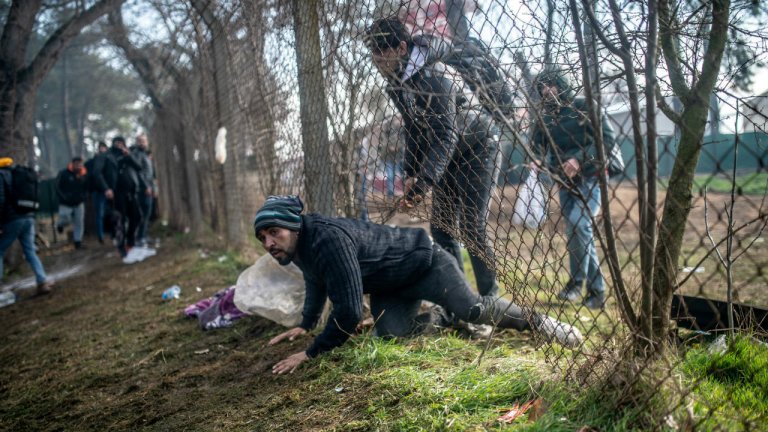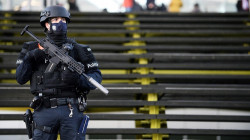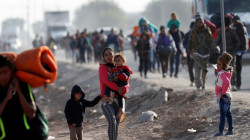Death tickets pin Iraqis' hopes on the barbed wires of Europe's borders

Shafaq News / In a scene that even motion pictures cannot depict, the borders of Lithuania, Latvia, and Poland with Belarus became a spectacle of death to thousands of migrants, predominantly Iraqis, seeking the phantom of a better life in the old continent.
But the cries of Hiba, a child with her family at the border asking for water from soldiers standing on the other side, were enough to provoke the public opinion, official bodies, and international humanitarian organizations, after a long silence, and prompted the latter to intensify their activities near the border Belarus shares with Lithuania for up to 680 km on the one hand, and 418 km with Poland on the other.
Death tickets
According to Human Rights Watch, Belarusian authorities deal with migrants on their borders under strict "Die here or go to Poland" procedure. Still, Muhannad, who joined convoys of Iraqi immigrants to Europe and left his three children and wife in Baghdad, was unaware of what the time had up its sleeve for him.
"My brother did not get a job despite his bachelor's degree, nor did he succeed in keeping his small business (a mobile restaurant) on a main street in al-Baladiyat, east of Baghdad, running because of harassment of the municipality officers and heavy fines," said Karrar, Muhannad’s brother.
Karrar added, "recently, municipality harassment has exacerbated and my brother's expenditures and debt have accumulated, prompting him to sell his restaurant and borrow money from a friend to secure the costs of his travel to Belarus, then Poland, and Germany ultimately, hoping he can secure a residence there and reunite with his wife and children. However, nothing has been achieved other than that he is stuck at the borders in Belarus and hopes to be allowed to cross into Lithuania amid harsh climatic conditions and scarce food and water."
In 2020, the borders of the eastern European countries of Belarus and Lithuania recorded the transit of more than 80 refugees by illegal means. Last August, more than 4,000 migrants crossed the borders, by official routes or by known smugglers with little problem, according to the Border Guards stats.
Premeditated smuggling
To reach Europe, the migrant has to pass "through the gates of death," like the owners of some travel agencies that provide tickets for those wishing to pursue this conquest prefer to say.
Shafaq News agency met with an owner of a travel agency in Baghdad, who explained, "Most of the passengers traveling through our company to Belarus, Turkey, or countries close to the European Union receive original tickets and official approvals and the company has nothing to do with any details concerning the passenger (migrant) after arriving in the destination he wishes, as indicated by his passport."
"The groups of migrants wishing to reach Germany or other European countries are organized by smugglers known to the local authorities of the countries at the EU borders, and in exchange for large sums of money," he said.
"Most of the passengers boarding tourist trips to Belarus or Moscow are young. Half of them usually miss the dates of their return trip to Iraq under the pretext that they have extended their stay: a health emergency or delayed university admission applications. The flight official has no right to pressure them or force them to return," he continued.
"The numbers are increasing drastically, particularly with the attractive offers made by some smugglers promoting studying or treatment trips in Belarus or Germany, in exchange for a significant amount of money. Both parties, the migrant and smuggler, agree upon the smallest details: the escape or illegal transit routes to the EU countries, transportation (usually rudimentary fishing boats or dilapidated transport buses), food, water, and supplies," the company owner added.
Four to six thousand migrants
"The ministry, in coordination with the relevant authorities, continues its meetings to seek effective solutions to end the suffering of Iraqi migrants stranded there," Karim al-Nouri, the undersecretary of the Iraqi Ministry of Migration and Internally Displaced Persons, told Shafaq News agency.
Al-Nouri said, "the ministry does not have official data on the numbers of migrants, but they are roughly between 4,000 and 6,000 migrants, including Kurdish youth."
"I will be heading to the Belarusian border with a government delegation under my chairmanship, including representatives from the ministries of Foreign Affairs and Interior (passport, nationality, and residence), the National Security Agency, and the Intelligence service, as well as a representative from civil aviation," al-Nouri said, "the delegation will address or seek genuine solutions with EU officials for the families whose asylum petitions have been refused and visit the temporary camps pitched for those families and offer free tickets to those wishing to return to Iraq voluntarily."
Al-Nouri explained, "the Iraqi Ministry of Foreign Affairs has made significant efforts to alleviate the difficulties for those families, particularly those who wish to return and have lost their passports, initially by awarding them temporary travel permits to return to Iraq."
Relief assistance
The United Nations High Commissioner for Refugees in Iraq (UNHCR-Iraq) spokesperson, Firas al-Khatib, told Shafaq News Agency that the UN refugee agency contacted the Red Crescent organization in Belarus to provide relief to the migrants stranded at the Belarusian borders with Lithuania and Poland.
Al-Khatib said that the agency dispatched a special mission to the Belarusian borders with the European Union countries, "but the Belarusian authorities did not grant us access to the families stranded at their borders... we are holding talks with the International Migration Agency to repatriate them."
"Relentless efforts and international pressure have enabled our teams to find swift solutions. We are holding discussions with the International Organization for Migration (IOM) a way to voluntarily evacuate those stranded there," he said, hinting at a near resolution of the crisis.
Kurdish Immigrants
Refugee organizations believe that more than 10,000 migrants in Belarus wish to pass into EU countries, the majority of whom are stuck in forests in the border areas encircled by barbed wire between Belarus and Poland, nearly half of whom are Iraqis, the majority of latter originate from Kurdistan.
According to the Kurdistan Regional Government (K.R.G.), the issue of migrants at the border between Poland and Belarus has recently become a topic of discussion for several internal and international organizations, as well as the media.
"Several parties are attempting to use this as a pressure card, claiming that the living conditions of the Region's citizens are a reason for their migration, many of whom are part of Kurdistan's citizens who have gathered near the Belarusian borders and are attempting to go to Polish territory," Dindar Zebari, coordinator of International Advocacy in K.R.G., stated.
"Migrants go to European countries through neighboring countries on tourist visas or by any other way," Zebari explained, adding that thousands of people have been collected up through multiple trips after providing them with major facilities until they reach the borders of the EU countries.
"Some of them live in Kurdistan and Iraq, but there are people of other nationalities among them," he said, adding that migrants tell false stories about the Kurdistan Region for their applications to be accepted. They are exploited by "political traders" to discredit the Region.
Between a job that provides a consistent income and a small space to express their thoughts freely, several thousands of Iraqi youth clinch the barbed wires of the European borders waiting for the gates of hope to open.





